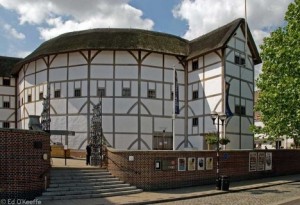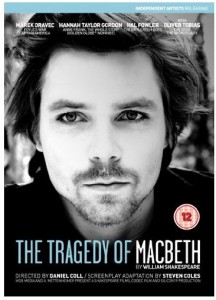The play, the play and the other play.
London is a wonderful playground, particularly if you love a good play. I was expecting to be wowed by my first theatre trip of the weekend and in so many ways I was. Eve Best’s Macbeth in the Globe, with it’s soaring violins, pounding drums, cacophony of creepy witches, sumptuous Jacobean costumes (finally a version which resists the urge to ‘modernise’) and genuinely terrifying Lady Macbeth (Samantha Spiro) whipped along at a tremendous pace. The hiss of Lady M entreating her husband to “screw your courage to the sticking place”, the mounting tension as Duncan’s body is discovered and all eyes turn to Macbeth (Joseph Millson), the arrogant majesty of his coronation as his wife physically shrinks under the weight of her gown and crown and the powerful presence of Banquo (Billy Boyd) stalking his former friend at the Banquet (even if this scene was otherwise played for laughs) carry us forward to the interval at a breathtaking pace.
The second half surges out of the blocks with the witches cauldron spewing forth the future in an instant, while echoes of Lady Macbeth threatening to pluck her nipple from her child’s boneless gums resonate as one of the witches gently lays a baby into Macbeth’s open childless arms and assures him that “none of woman born shall harm Macbeth”. All too soon we are drowning in palpable loathing and panic and fear as Lady Macduff realises that innocence is no protection against evil in this world; we experience the heartbreaking pause in the action as Macbeth receives news of his wife’s death; we hear the sickening crack as Macbeth’s head is snapped off his body and he lurches to the floor, and lose ourselves in the haunting melody of the witches final song. All of these moments will stay with me.
So, too, will the unexpected moments of humour the cast so cleverly found in an otherwise, let’s face it, pretty bleak script. As they await Macduff, gone to awaken Duncan, Lennox’s ponderous, elaborate description of the turmoil in nature is met with Macbeth’s eye-rolling dry retort “twas a rough night” just to shut him up. As the nobles spill out of the banquet, one idiot stays behind to try and ease the awkwardness of the situation, but his clumsy spluttering of “better health” for the King is met with gales of laughter from the crowd and a disbelieving stare from the shattered Lady Macbeth. When Malcolm accuses himself of boundless lust, with some pretty funny thrusting and moaning, Macduff gestures to the standing crowd with the line “we have willing dames enough” and Malcolm’s later sheepish admission “I am yet unknown to woman” brought the house down almost as uproariously as when Macbeth told the porter to get back in his box.
And yet something was awry. Part of the problem lay with my over-familiarity with the source material. For the first few scenes I was like a teenager at a One Direction concert, lip-syncing along to every line. But willing suspension of disbelief demands that you buy into the notion that the characters are spontaneously making this stuff up – which is difficult when every line is playing in your head before the character even opens their mouth.
The second problem lay not with me but with the play’s interpretation of Macbeth’s journey. I’ve always loved the way Macbeth and Lady Macbeth’s journeys mirror each other in reverse – as she finds that she can no longer stop up the access and passage to remorse, he uncovers the very ruthlessness his wife believed him incapable of as the play began. But this vulnerability, this “milk of human kindness” is so rarely on show in Joseph Millson’s very edgy physical portrayal of this most complex of anti-heroes, that we don’t ever really get the sense of this being a journey from good to evil. I’ve always believed that the strength of this play lies in our ability to feel “horror, horror, horror” at his fall from grace, a horror so powerful that we bless ourselves and mutter ‘but for the grace of God go I’. Instead, we get a journey from sanity to insanity, a less moving, less profound, less frightening vista entirely. So when Macbeth began that most famous of soliloquies “tomorrow and tomorrow and tomorrow” I was devastated to hear him creep in a petty pace from word to word, as though he believed that inserting long pauses into the speech would be enough to create drama or pathos. It may have worked for others, it did not work for me and it made me sad to be in the Globe and yet so unmoved at this most emotional juncture in Shakespeare’s great tragedy.
The second play was play of another kind altogether, teasing my sister that I visit only as an excuse to go to the theatre; meeting up with Simon Pile, one of my fellow ADE’s to dream dreams of what might lie in store for Cinetivity, our six-strong creative conclave born in Cork; eating a leisurely lunch of chilli men and coconut ice-cream for desert; again teasing my sister and her lovely husband Kevin that I visit only to go to the theatre and then planning when I should come back and what shows I really can’t afford to miss and remembering, if ever I had forgotten, that she and I are kindred spirits really, even if our mutual obsession with work work work means we don’t connect as often as sisters should.
The final play, recommended by Simon (I am now eternally in your debt my friend) was a curious incident indeed. In life, sometimes, unexpected moments grab you by the throat and you are helplessly at their mercy, trapped in a spell of magic and enchantment and awe. And so it was last night with “The Curious Incident of the Dog in the Night-Time“. I do not have a review to offer you. There is nothing to critique. I have only overflowing praise for a performance and production which amounted to a flawless piece of theatre. If somehow the planets align for you, go and see this play. It speaks so profoundly to our foibles and our flaws and to the tragic beauty of the human condition that I find myself even now stuck in a wonderful moment, reliving the experience with a pang of joy in my heart. Moments which “catch the heart off guard and blow it open” are rare in life and having so many of them in one weekend is blessing indeed.
So as the noise of a million connections reinserts itself into my life later today, I remember that in life it is always good to play.
And play.
And play.








